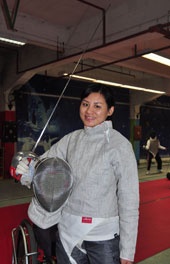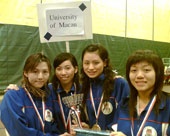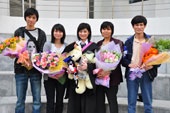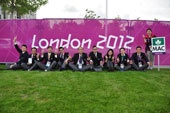
In the face of great changes in life, some people are unable to get up after a fall and give up but some become stronger and more courageous, refusing to bow to fate. The first wheelchair fencing athlete in Macao, Lao In I, demonstrated the unflagging spirit of an athlete in dark times, demonstrating her optimistic personality in fighting disease after repeated operations, minor and major, and finally emerging onto the stage of the Paralympic Games to become the first wheelchair fencing athlete to represent Macao. Lao encourages disabled athletes through her actions: by insisting on training and enhancing self-esteem, the sun will shine upon you one day.
Life changes when tumour diagnosed
Lao has been active in sports since childhood and started practising fencing in secondary school. She arose as a new force in the local fencing delegation and participated in youth sports events held in Asia. Following admission to the University of Macao, she represented it by participating in many events. Everything seemed to promise her a smooth career as an athlete but in the summer of 2006 her life took a critical turn when a tumour was diagnosed in the tibia of her right leg.
“At that time I suffered from leg pains and frequently went to the bone-setter,” she recalls. “Even physiotherapy could not help improve my situation, so I decided to have an X-ray and the source of my problem was found.” The size of the tumour was not small when diagnosed and it also took time for the laboratory test to determine whether it was benign or malignant. The doctor therefore advised her to have an operation as soon as possible. To Lao, the news was like a bolt from the blue, she said. “I was really frightened and didn’t know how to tell my family for fear they would worry about me.”
Hospital as home following operations
From the time she had her first operation, the hospital became her second home. Due to repeated relapses, she has undergone more than ten operations in Beijing, Hong Kong and Macao. She spent most of her college life – which was supposed to be the freest and happiest of her life – in hospital. Despite her optimism, Lao admits that she once thought about giving up, “After the first operation, the doctor told me that I could stand again after rehabilitation but things went contrary to my wishes. Going to the hospital is like a vacation to me. For four consecutive years, I spent Christmas and New Year in hospital, with the longest stay more than half a year.”
Friends and family provide motivation
Lao went to college in the mornings after her injections and returned to the hospital for treatment after class. Life was never easy but Lao would not give up and insisted on going to the college in a wheelchair during her treatment. With the aid of her classmates and friends, she smoothly finished her bachelor’s degree in Portuguese and is currently taking a second bachelor’s degree in sociology because of her desire to study further. What helps her battle through? The reason is very simple, she replied, “In the eyes of my family, I’m a bright and tough person, so I stick at it.” Her friends also motivate her to persevere. During the rehabilitation period, she periodically updated her treatment and rehabilitation progress and status on her personal webpage lest they worried too much or repeatedly asked about her condition.
Sport takes her to a higher place
In the age of pursuing dreams, Lao’s wings are not broken because of her illness but she desires to fly higher. By chance, she had an opportunity to meet Antonio Fernandes, President of the Macao-China Paralympic Committee. Following their first meeting, the two likeminded individuals soon decided to start the new sport wheelchair fencing in Macao. In less than a year, Lao successfully won the right to compete in the Paralympic Games and was ranked 9th in the women’s individual foil and epee.
Through sport, Lao regains confidence and encourages the disabled to step forward to communicate with the outside world, saying, “I understand that it takes time for oneself to accept his or her disability. Whilst training on the Mainland, I saw that athletes with disabilities there have very high self-care capabilities. People with disabilities in Macao can do this too, and this can be done step by step.” Lao believes that sport is the best way to reintegrate into the community. They need not necessarily participate in competitive sports, just use sport as a means of physical training.
Development of fencing hampered
Lao is the only wheelchair fencing athlete in Macao and thus the development of the event is restricted and training conditions affected. “I’m the only competitor and sometimes it’s embarrassing to apply for a venue and coach from the government. I’ve conceived a plan to promote wheelchair fencing to young people with disabilities in the future and also hope that more people can participate in this sport. The school is conceived as the first gateway but there’s a certain difficulty in finding the right candidates.”
With regard to the lack of initiative of disabled people to participate in sports, Lao said, “Sometimes they’re not unwilling, they just don’t know by what means and methods they can engage in these activities. They’re also hindered by other reasons; for example, younger disabled persons often need to be accompanied by their family, transport facilities are not comprehensive enough, and there’s a lack of time because of work reasons, etc.”






